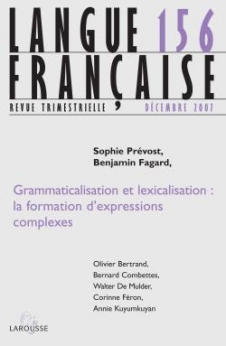
Langue française n° 156 (4/2007)
Pour acheter ce numéro, contactez-nous
Recevez les numéros de l'année en cours et accédez à l'intégralité des articles en ligne.
This article intends to demonstrate that verbal phrases such as prendre garde, estre en garde, avoir garde, etc. (lit. ‘take, be in, have care’) in French might not be as rigid in terms of syntactic pattern as one could think, especially in Old French (11th – 13th centuries). This study aims to collect as many occurrences as possible of the different structures of verbal phrases using the noun garde in the structure : [verb + (preposition) + garde]. Several points are evaluated : 1/ what is the consequence, if any, of the lack of determiner in the verbal structure?; 2/ how does it affect the semantic evolution of the whole structure? We show in this article that, in Old French, many syntactic verbal structures which apparently could be considered as verb phrases because of the use of a bare noun do in fact develop a specific meaning (general versus particular), but should not be seen as syntactic phrases.

